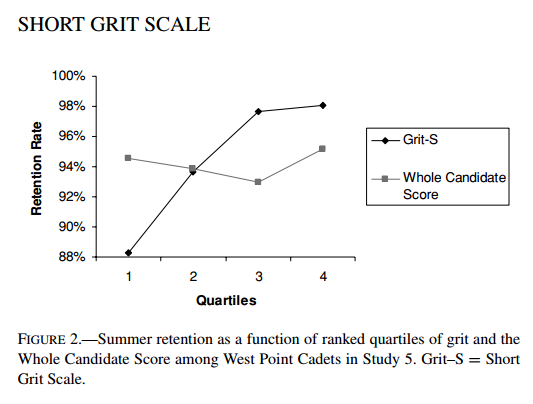Across six studies, the authors of this article create and then attempt to prove the predictive validity of a shorter version of their previous, 12-item Grit Scale.
In study one, using data from an older study, the 12-item grit scale was successfully shortened into the 8-item grit scale (Grit-S).
In study two, using an online sample of 1,554 adults, the 8-item grit scale was found to contain many of the same properties as the longer 12-item grit scale – it was highly correlated with conscientiousness, contained two factors (perseverance of effort and consistency of interest), predicted educational attainment, and was inversely correlated with the number of career changes.
In study three, 161 adults completed an informant version of the Grit-S for a friend and family member, who then completed the self-report Grit-S. The two versions – information and self-report, were found to be acceptably correlated (that is, they both measure approximately the same factors).
In study four, Grit-S in 2006 was found to predict GPA and Grit-S in 2007, suggesting that the trait is relatively stable over time. Grit was also inversely correlated with hours spent watching TV.
In study five, cadets who scored a standard deviation higher than average on the Grit–S were 99% more likely to complete summer training (known as Beast for its difficulty).
In study six, gritty national spelling bee finalists were found to be more likely to reach higher rounds.
Overall, the Grit-S was shown to have most of the same properties as Grit-O.
Click here to learn more about grit.
Study Details
Study 1: Using four prior samples (two of West Point cadets, one of spelling bee finalists, and another of college students), the authors cut the two least individually predictive items for each of the two subscales (perseverance of effort and consistency of interest), leaving 8 items.
Study 2: An online sample of 1,554 participants completed the Short Grit Scale, the Big Five Inventory, their age, gender, level of education, and number of times they've changed careers.
The Grit-S was confirmed to retain its two factors: perseverance of effort and consistency of interest. Like with Grit-O, Grit-S was highly correlated with conscientiousness (r=.77). Also like Grit-O, Grit-S predicted educational attainment and number of career changes.
It's unclear if predictive ability was lost, that is, if Grit-S predicts less accurately than Grit-O.
Get Inspired with Quotes About Grit and Perseverance
Study 3: An online sample of 161 participants completed an informant version of the Grit-S for a friend and family member, who then completed the self-report Grit-S.
The informant and self-report versions of the Grit-S had an internal consistency in-line with what are considered accurate informant questionnaires. The two versions had a correlation of .45 for family members, and .47 for friends.
Study 4: A continuation of a previous grit study, 279 high-school students retook the Grit-S, in addition to providing their GPA and hours spent watching TV.
The correlation between Grit-S in 2006 and Grit-S in 2007 was .68, high enough to demonstrate temporal stability. Grit-S in 2006 also predicted GPA one year later and hours spent watching TV.
Study 5: Using a third cohort of West Point students (two cohorts were used to establish the original Grit Scale), 1,248 freshmen cadets completed the Grit-S.
Cadets who scored a standard deviation higher than average on the Grit–S were 99% more likely to complete summer training (known as Beast for its difficulty).
Study 6: Using a second cohort of spelling bee finalists, 190 finalists completed the Grit-S and Big Five Inventory.
Again, Grit-S was strongly correlated with conscientiousness (r=.7). Grit-S also predicted how far finalists reached in the competition.
Participants who scored 1 standard deviation higher on the Grit-S were 38% more likely to advance to further rounds.
Duckworth, A. L. & Quinn, P. D. (2009). Development and validation of the short grit scale (Grit-S). Journal of Personality Assessment, 91, 166-174.

